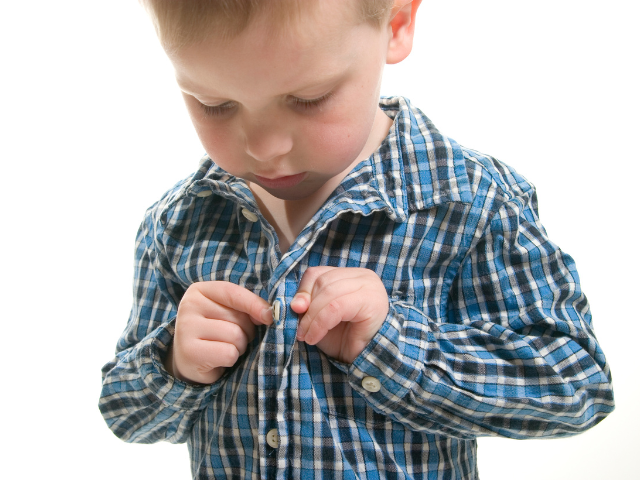Now that you’ve discovered the amazing superpowers of executive functioning, it’s time to be on the lookout for any challenges your child might face in developing these skills. Knowing about these difficulties early on gives you the power to get your child the right help and support, making sure they soar to new heights!
It’s important to remember that kids will continue to develop their executive functioning skills into adulthood. As adults, we must ensure our expectations align with that developmental trajectory. However, we can also be on the lookout for any developmentally atypical executive functioning weaknesses so that we can support our kiddos!
Executive Functioning Milestones
See the table below for common executive functioning developmental milestones. Remember, these are general guidelines. Every child develops these superpowers at different paces. For example, when kids are about three years old, some might begin to show differences in how they think and learn. Some of these children may get diagnosed with Attention-Deficit/Hyperactivity Disorder (ADHD) when they get older. Compared to kids their age who do not have ADHD, these children might be 2 to 3 years behind in developing executive functioning skills. Additional delays have also been seen in children with language disorders and autism spectrum disorder (ASD).
It’s important to understand your child’s skills based on their abilities, not just their age. This way, you can provide the right support and help them improve at their own pace (keep an eye out for the last article in this series, which will focus on those supports!). Also, by monitoring their skill development, you can effectively communicate concerns to your child’s doctor.
Paying Attention
Knowing how you’re doing right now and understanding how your actions can affect other people.
| Developmental Milestones | ||||
| 0 – 12 months | 12 – 24 months | 24 – 36 months | 36 – 48 months |
48 – 60 months |
| Focus on objects and faces, responding to sounds and movements around them | Looks at and attends to pictures in books; concentrates on simple activities or toys for short periods of time | Sustain attention to preferred task or activity for 5-8 minutes | Increase in attention span depending on activity (10-30 minutes) | Can switch attention between tasks easily; increase in attention span depending on activity (30-60 minutes) |
Managing Impulses
The ability to resist distractions and control your actions without giving in to impulsive urges.
|
Developmental Milestones |
||||
| 0 – 12 months | 12 – 24 months | 24 – 36 months | 36 – 48 months |
48 – 60 months |
| Displays “anticipatory looking” or turning head to look towards familiar sounds/words and anticipate seeing something related to that sound/word; brief pauses before reacting to sound/movement | Begins to display a sense of safety, like stopping themselves from touching things they are not supposed to; they start to wait their turn for things. | Can wait to be rewarded or display delayed gratification with the support of an adult | Begins to show self-control and take turns; can ignore distractions | Can wait for something that they want; can stay calm in frustrating situations with minimal adult support; follows safety rules and begins to follow classroom rules |
Adapting to Change
Considering different perspectives and adapting your behavior when faced with unexpected situations and changes.
|
Developmental Milestones |
||||
| 0 – 12 months | 12 – 24 months | 24 – 36 months | 36 – 48 months |
48 – 60 months |
| Not applicable at this age. | Basic problem-solving skills like fitting shapes into matching holes; Beginning to engage in role-play/imaginative play, climbing stairs to go down a slide. | Engage in elaborate imaginative play (i.e., taking different roles, acting out different situations) | Begins to manage unexpected changes without getting upset; Begins to negotiate roles during play | Can follow a group plan without frustration; can pause an activity and return to it later when interrupted; follow different rules/guidelines for different situations. |
Managing Feelings
Knowing and properly managing your emotions.
|
Developmental Milestones |
||||
| 0 – 12 months | 12 – 24 months | 24 – 36 months | 36 – 48 months |
48 – 60 months |
| Developing self-soothing abilities; getting adult attention when upset; displaying basic emotional responses (i.e., smiling when happy or crying when upset) | Begin to communicate feelings by protesting and expressing preferences non-verbally. | Aware of actions and emotions and may be able to express basic feelings verbally | Can label not only own emotions but also emotions of others; asks for needs/desires to be met. | Talks about own feelings and can begin to connect feelings to their behaviors; respond to others’ emotions; displays empathy and emotional control. |
Getting Started
Starting tasks without delay and coming up with ideas without relying on others.
|
Developmental Milestones |
||||
| 0 – 12 months | 12 – 24 months | 24 – 36 months | 36 – 48 months |
48 – 60 months |
| Focuses on objects; points and grabs items; explores surroundings; assists with feeding (turn head towards food or reach towards food) | Assists with basic care tasks like getting diaper before changing, washing hands, brushing hair, following single-step directions | Can follow and complete multi-step (two or three-step) directions; can independently feed self; wash hands and dress self with little help. | Independently start and complete tasks that may take up to 10 minutes; can think creatively to find solutions to problems. | Pick out their own clothes to wear and can independently dress; helps with daily tasks/activities like setting the dinner table and cooking. |
Remembering Information
Recalling and using information at a later time.
|
Developmental Milestones |
||||
| 0 – 12 months | 12 – 24 months | 24 – 36 months | 36 – 48 months |
48 – 60 months |
| Recognizing familiar people; “object permanence” understanding that objects still exist even when they are out of sight; expresses enjoyment in familiar songs | Remember and follow simple routines and sequences like hide-and-seek; participates in familiar songs. | Can sequence events independently (i.e., tell what they did in the morning) | Ideas for play begin to come from past experiences, thus creating more complex play; engage in symbolic play where objects represent other things; use terms “I think – I know” | Understand and recall rules, expectations, and instructions; begin to recognize that their thoughts may be wrong and may question thoughts. |
Getting Organized
Setting and meeting goals to handle tasks that are happening now and in the future.
|
Developmental Milestones |
||||
| 0 – 12 months | 12 – 24 months | 24 – 36 months | 36 – 48 months |
48 – 60 months |
| Displays interest in color, size, and shape of objects; displays beginning ability to connect “what” they want to do/get and “how” to do/get it through basic play skills or body movements. | Begins organizing, matching, and sorting by color, shape, size | Planning simple activities or goal setting, like building a tower or completing a puzzle | Sort objects based on function; can sort cards based on one category but displays difficulty re-sorting when provided another category (i.e., sort by color then by suit) | Can make simple lists and start to set goals and work towards them with some help from an adult |
Staying on Track
Checking your own performance while completing a task.
|
Developmental Milestones |
||||
| 0 – 12 months | 12 – 24 months | 24 – 36 months | 36 – 48 months |
48 – 60 months |
| Looking to find a hidden toy | Engages in cause-and-effect play; begins to imitate and copy others | Can work independently on tasks; begin to manage time and understand the concept of time like “tomorrow” or “yesterday”; can follow visual picture schedules | Understands more concepts of time like seasons, days, and weeks; practices waiting and turn-taking; can identify and fix errors | A deeper understanding of cause-and-effect relationships in not only items but themselves and their actions; engage in self-reflection or reflection on their behaviors and actions |
Managing Stuff
Keeping track of materials/belongings.
| Developmental Milestones | ||||
| 0 – 12 months | 12 – 24 months | 24 – 36 months | 36 – 48 months | 48 – 60 months |
| Not Applicable at this age. | Begins to recognize where objects go/live | Can put items away where they found them with minimal prompting from an adult | Independently cleans up toys and helps clean up other messes | Will put laundry away and clean up after themselves |
Observing Your Child’s Executive Functioning
Keep an eye on your child’s behavior at home, daycare, preschool, and with their siblings and/or friends. See how well they can focus, follow instructions, keep things organized, and manage their time and complexity of play. Don’t forget to team up with their teacher if they are in school. Teachers can be like sidekicks, providing valuable information on how your child handles academics and social situations and how they follow directions, engage in play, and perform tasks independently.
Getting Help
If you spot any persistent or significant challenges, it’s time to call in the professionals – pediatricians, and psychologists! With this knowledge, you have the power to advocate for your child, and early support can make a real difference in their academic and social success.
All kinds of interventions can help, like educational support, personalized strategies to boost executive functioning, behavioral therapy, and accommodations at school. And guess what? You, the parents, have a crucial role to play too! You can provide a structured and supportive environment. Help your child break tasks into smaller steps. You can also teach your child super coping strategies for emotions and problem-solving that can help them across settings.
Concluding Thoughts
This article is a part of a three-article series where we share fantastic strategies and activities to help your child’s executive functioning skills grow even stronger. Remember, every child is unique, and occasional challenges are normal in the superhero’s development journey.




